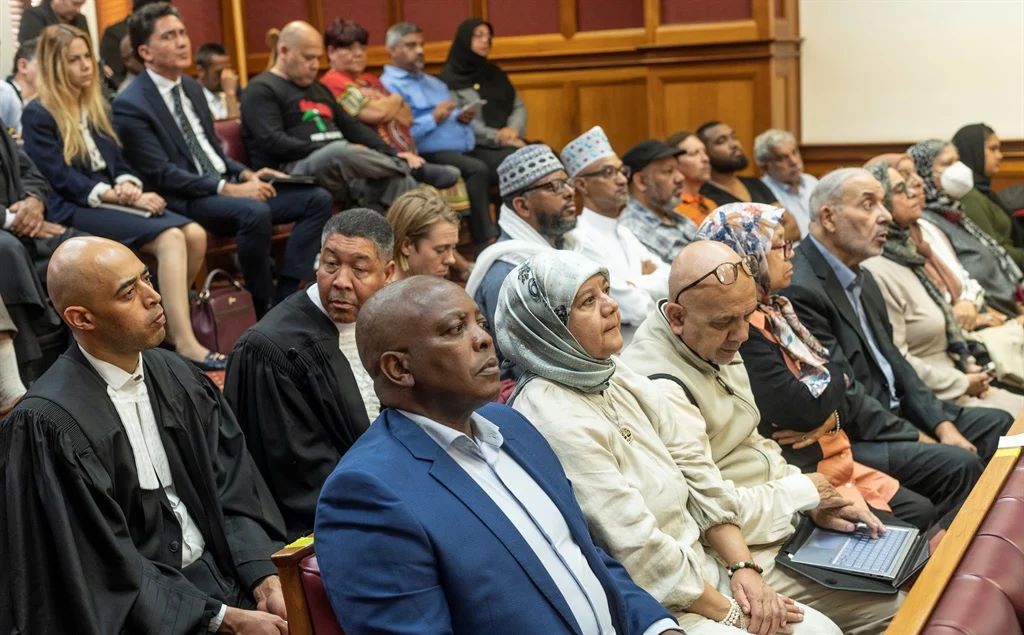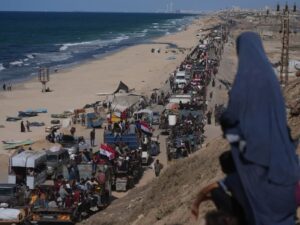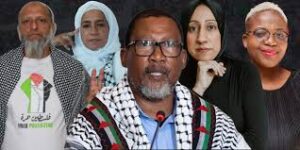
Nkosinathi Biko and children of Imam Abdullah Haron at Haron's death inquest at the Cape Town High Court. [Gallo/ Brenton Geach]
Evidence being given into the brutal murder of anti-Apartheid activist Imam Haron in 1969 brings to life the shadowy figures that brought terror into the lives of those who opposed the system, writes an Al Qalam reporter & agencies.
The inquest into the death of political activist Imam Abdulla Haron – 53 years after his murder – has once again shone a spotlight into terror tactics that was used by apartheid era cops of the Security Branch (SB) from the 60’s till the late 80’s.
Witnesses giving evidence in the inquest – being heard in the Western Cape High Court – have painted a gruesome picture of the terror that Imam Haron would have endured during his interrogation by the SB police who then killed him in 1969.
For his children Shamela and Muhammed who listened intently, the inquest – though painful to hear – has finally happened. It is being heard by Judge Daniel M Thurlare. They sat in the gallery flanked by family, friends, and other members from Cape Town’s Muslim community.
The inquiry sets out to determine the cause of the late cleric’s passing and whether anyone can be held accountable.
Haron was arrested for alleged terrorism on 28 May 1969 and, after 123 days in custody, was found dead in his concrete cell at the Maitland police station on 27 September 1969.
An inquest in 1970 concluded that although he had 27 bruises on his body, congested kidneys, and intestines, and cracked rib cartilage, the injuries were most likely caused while rounding the landing for the final flight of steps at Cape Town Central police station.
That was where he was being interrogated for alleged terrorism, with no formal charges or a court appearance in sight.
His family had never accepted this explanation and is dismayed that it took 53 years to reopen the inquest.
On Thursday, Haron’s son Muhammed, in a rare outburst of anger, said he found it shocking that the democratic government had done so little to investigate and prosecute apartheid-era crimes and that it let Truth and Reconciliation Commission findings gather dust.
Professor Muhammed Haron, Imam Haron’s only son, wants the inquest to come to new findings.
“We basically want it to turn the 1970 inquest findings on its head, so to speak, and have fresh finding based upon the expert opinions. If that happens, then of course there’ll be some sort of closure, not total closure, but some sort of solace. At least then we can move ahead.”
Evidence from witnesses which include former detainees, pathologists as well as a trajectory and aeronautical engineer will form part of the inquest.
A former district surgeon, Dr Steven Naidoo, told the court that Imam Haron was most likely kicked, punched, stomped on, and hit with a truncheon while detained by the Security Branch in 1969. He told the court that the foetal position that Imam Haron was found in inside a cell at the Maitland police station in Cape Town also ‘showed he would have been in extreme pain and emotional distress at the time of his death.’
Naidoo said during the blows to his body, and the lack of proper medical treatment, would have been very disabling to the Imam, both mentally and physically.
In lengthy explanations – aided by life-sized cardboard cut-outs with the position of Haron’s bruises painted on them – Naidoo declared that it was highly unlikely that Haron died as a result of injuries from falling down the steps. He said the pathologist missed so many clues that he wondered if it was wilful.
Earlier, a retired police officer Johannes Burger, who received a medal for combating terrorism among other commendations while serving the apartheid police, denied any knowledge of torture activities at the Security Branch.
Statement
Haron family’s lawyer Howard Varney questioned him about the relationship between the uniform branch of the police and the Security Branch.
Varney: “So you were completely ignorant of the Security Branch”
Burger: “I had nothing to do with them, the only time I did was when I made the statement to them about how I found the body”.
Earlier in the proceedings, veteran SACP activist and former political detainee Jeremy Cronin testified about his experiences in detention between 1976 and 1983, and about his interactions with one of the security branch officers involved in the Imam Haron case, Johannes “Spyker” van Wyk.
Cronin, who had been called by Varney on behalf of the Haron family, said when he was interrogated by Spyker van Wyk. The feared security branch policeman had been wearing what he described as “a butcher’s apron” covered in red spots.
He said he was never sure if this was actual blood or just theatrics to intimidate him as van Wyk and another officer whose name he couldn’t recall played “bad, bad cop and less bad cop” during his interrogation.
A former political detainee, Yousuf Gabru, who was arrested for being in possession of a list of the titles of Marxist books, said: “I was interrogated almost every day, I was punched and beaten almost every day.”
During the in-loco inspection of Cape Town Central police station, he showed the judge where the political prisoners were kept and where he was held.
“I was interrogated almost every day,” said Gabru, “I was punched and beaten almost every day.”
Gabru said the Security Branch had no limits when it came to cruelty during interrogation.
He said: “You shouldn’t think of them as normal human beings. They were completely abnormal”
The inquest continues. (EWN, News 24)










